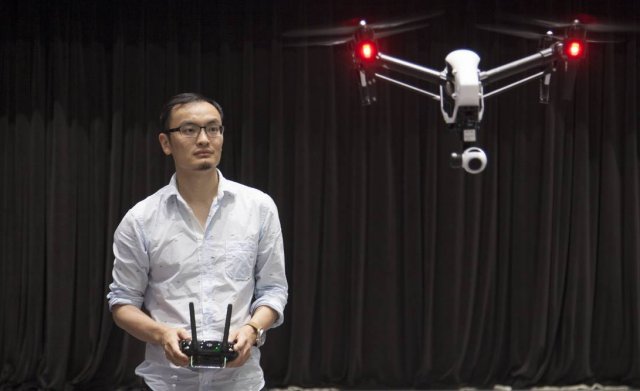Chinese consumer drone maker DJI is in talks to raise funding at a valuation as high as $10 billion, according to people familiar with the matter, in what would be a sizeable bet by investors that flying robots will overcome looming regulation and safety concerns.
Several venture-capital firms including Accel Partners and Kleiner Perkins Caufield & Byers have offered to invest, though the terms of the funding round are still being ironed out, these people said. The company is seeking to raise hundreds of millions of dollars in the round, according to these people.
DJI confirmed it is in talks with investors but declined to comment further. Forbes earlier reported news of the talks.
A deal would propel DJI into an exclusive camp of the world’s most valuable startups, reflecting the company’s dominance of an entirely new electronics category that is quickly gaining mainstream popularity.
SZ DJI Technology Co., better known as DJI, helped launch a consumer-drone craze in the past two years by bringing to market remote-controlled, four-propeller helicopters that are easy to fly, weigh under 3 pounds and can shoot stable aerial footage. The Shenzhen, China, company has sold tens of thousands of its Phantom drones at roughly $1,000 a piece, enabling filmmakers, hobbyists and journalists to document the world from a new vantage point.
DJI expects to top $1 billion in revenue this year, roughly eight times the $130 million recorded in 2013, according to people familiar with the company’s financial documents.
Unlike many other startups achieving multibillion-dollar valuations, DJI hasn’t raised multiple rounds of funding. The company said it has taken minimal outside capital since Chief Executive Frank Wang founded it in his Hong Kong dorm room in 2006, and instead has largely used cash flow to fund its rapid expansion over the past several years.
Sequoia Capital has previously invested in DJI, according to people familiar with the matter. That investor wasn’t previously disclosed.
Late last year, DJI said it had 2,800 employees and three Chinese factories; it had just 90 workers in 2011.
With little outside money, the company has continued to develop new products, including two drones in the past six months. Funding could enable DJI to develop drones targeted for specific commercial or industrial applications, where industry officials expect much of the growth over the next several years.
The global technology community has been abuzz about drones for several years, excited not only by the prospect of a new consumer-product category but also the technology’s promise to transform industries from filmmaking to farming to construction.
Investors have bet on other drone hardware and software firms in recent years, but none of the investments approach the potential size of DJI’s. Its top rival, California-based drone maker 3D Robotics Inc., has raised more than $100 million over multiple funding rounds.
DJI comes with risks. Its Phantom drones have been plagued by so-called flyaways, in which the user loses control of the drone and it flies off. Drone users suspect that such a malfunction was responsible for the Phantom that crashed on the White House lawn this year.
DJI has said user error is typically the culprit in flyaways, but that it is working to prevent such incidents.
More broadly, governments around the world are considering ways to curb potential threats to air safety, public safety and privacy. The Federal Aviation Administration, which has largely banned commercial use of drones for years, has proposed rules—expected to be made final in late 2016—that would allow such use but set strict limits, including prohibitions on flights in urban areas and beyond the sight of operators.
Drone proponents also worry that one high-profile incident—such as a collision with a passenger jet or a terrorist attack carried out with a small drone—would lead to stifling regulations for the industry.
Some investors are skeptical of the longevity of hardware makers like DJI. In the evolution of other industries, including personal computers and mobile phones, software companies have eventually trumped hardware firms.
“Companies like DJI right now have good momentum, but they’re hardware makers…Next year and the year after that, you’re going to see hundreds of DJI clones,” said Chris Dixon, a partner at venture firm Andreessen Horowitz. “I don’t think long term that’s a good bet…Software is going to eat drones.”
Andreessen Horowitz has invested in drone-software firm Unmanned Innovation Inc., known as Airware, which has raised at least $40 million in funding, according to regulatory filings.
Others say that with fast-growing revenue, an already large fan base and an increasing push into software, DJI is one of the best bets in drones.
Bilal Zuberi, a partner at venture firm Lux Capital, which invests in drones, said DJI has the potential to capitalize on its early lead among drone manufacturers by making its operating system the go-to platform for app developers. He said the company could also attempt to eventually monetize much of the data its users’ drones collect. “This goes well beyond selling drones to grandmas on Christmas Eve,” he said.

